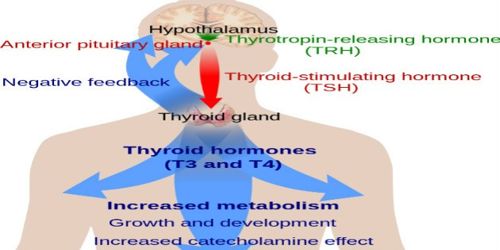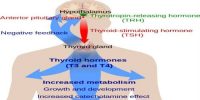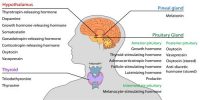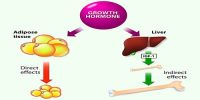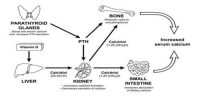Thyroid Hormone act to increase the basal metabolic rate, affect protein synthesis, help regulate long bone growth and neural maturation, and increase the body’s sensitivity to catecholamines by permissiveness. The thyroid hormones control essential body functions, including Breathing, Heart rate, Nervous systems, Body temperature, Cholesterol levels, etc.
The function of the Thyroid Hormone –
Calorie genesis
Stimulate heat production by increasing oxygen consumption of almost all metabolically active tissues.
Regulation of ion and water transport
Thyroid hormone regulation and water transport through the cell membrane by some metabolic effects at the cellular level.
On Intermediary metabolism
(a) Regulation of carbohydrate metabolism
- Increasing dietary intake of CHO (↑appetite in hyperthyroidism),
- Increasing the absorption of CHO,
- Glycogenolysis in liver, heart, skeletal muscle,
- Gluconeogenesis,
- ↑ Rate of insulin secretion.
(b) Regulation protein metabolism
- Increase transcription and translation by acting nuclear receptor,
- Therefore, all the cells cause great number or protein enzymes, a structural protein, transport protein etc.
- In hyperthyroidism-excessive protein catabolism and ↑ secretion in the urine.
(c) Regulation of fat metabolism
- Mobilization of lipid from the fat tissue to circulation,
- Increase conc. of free fatty acid to plasma,
- ↑ Oxidation of free fatty acid to produce energy,
- ↓ Conc of cholesterol, phospholipid, and triglycerides in plasma.
(d) Regulation of vitamin metabolism
Thyroid hormones increase the quantities of many enzymes and because vitamins are essential parts of some of the enzymes and coenzymes. So, thyroid hormone causes an increased need for vitamins.
Effects on growth
- Essential for normal growth and skeletal maturation growth
- Promotes growth and development of the brain during fetal life and few years of post fatal life.
- Potentiates action of growth hormone on the tissue.
Effects on Blood
TH increased cell mass and causes erythroid hyperplasia proportional to the enhanced oxygen requirement of the body.
Effects on skeletal muscle
- Weakness occurs in most patients in hyperthyroidism,
- Hyperthyroidism is also associated with muscle weakness,
- Fine muscle tremor.
Effects on Respiration
The increase rate of metabolism increases the utilization of oxygen and formation of CO2; these effects activate all the mechanism that increases the rate and depth of respiration.
